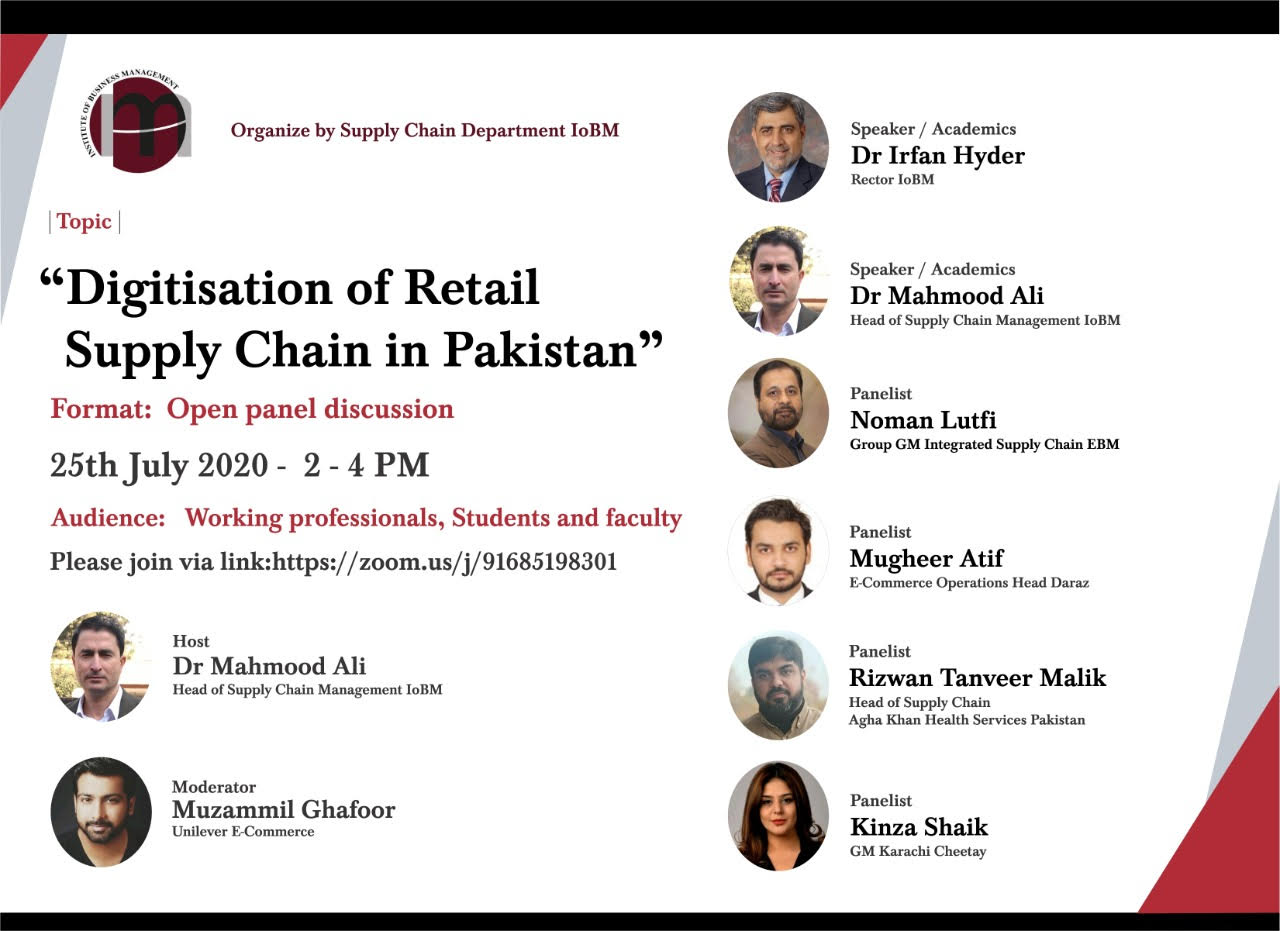
Industry experts provide insights on the digitization of supply chain dynamics
Zoom Panel Discussion held on Saturday, July 25, 2020
The Department of Supply Chain at the Institute of Business Management (IoBM) organized an online panel discussion via Zoom on Saturday, July 25, 2020. The topic of this discussion was “Digitisation of Retail Supply Chain in Pakistan.” Dr. Mahmood Ali, HoD Supply Chain Management, IoBM was the host while Muzammil Ghafoor, Unilever E-Commerce Manager was the moderator. The speakers of the discussion were Dr. Syed Irfan Hyder, Rector IoBM, and Dr. Mahmood Ali. The panelists included Noman Lutfi, Group GM Integrated Supply Chain, English Biscuit Manufacturers (EBM); Mugheer Atif, E-Commerce Operations Head, Daraz; Rizwan Tanveer Malik, HoD Supply Chain Aga Khan Health Services, Pakistan, and Kinza Shaik, GM Karachi, Cheetay.
While talking about how the digitization process has affected universities, Dr. Syed Irfan Hyder mentioned IoBM’s Learning Management System (LMS). He said that nearly 50 faculty members were already using LMS since Spring 2019 and were taking classes of nearly 100 sections. However, when the lockdown hit Pakistan, these 50 faculty members became the early adaptors of LMS and the new mode of teaching. Dr. Hyder said that the early adaptors played an instrumental role in enabling HoDs and other faculty members to become acquainted with the process of using LMS as an online teaching tool. He pointed out that the implementation of the LMS at IoBM predates the lockdown. He said that because of the lockdown, as IoBM had to be turned from a physical campus to an online campus, the three-year rollout period to implement LMS was completed in a matter of three months. He was pleased to share that 100% of faculty at IoBM has been teaching through LMS along with using Zoom and Google Class during the lockdown.
Rizwan Tanveer Malik said that the retail sector in the healthcare industry is facing a transformation. OPDs are now being replaced by telehealth products. Moreover, pharmaceutical industries are establishing channels in integration with healthcare set up to provide home delivery of medicines. Mr. Malik said that students need to understand supply chain terminologies and have to keep themselves updated once they enter professional life. The placement department of universities, he emphasized, will play a key role in facilitating students to avail internships at an organization’s supply chain department. He also mentioned that existing managers in the supply chain departments must exhibit temperament and patience especially in the industries that are not working 9-5 and are purely online and active round the clock.
While speaking about how digitization has added to the learning of companies, Kinza Shaik said that companies are opening dark stores and many have been set up across Karachi. She said that dark stores are mini warehouses created in high-selling areas. Instead of the rider going to the main warehouse of the city to collect the product, they identify the address where they need to make the delivery and acquire the product from the nearest warehouse to be delivered. This reduces the waiting time at the customer’s end. Noman Lutfi said that supply chain students need to know about the end-to-end supply chain and must acquire practical knowledge by completing internships. He also said that the teachers must also disseminate realistic and practical knowledge. He said that managers in the supply chain industry need to be empowered and must make on-the-spot decisions.
Dr. Mahmood Ali shared that academicians and universities must continuously evolve their course and syllabus especially when they are teaching about the impact of digitization on the supply chain. He said that students must pursue a proactive approach and learn more about their course by searching over the Internet. According to Dr. Mahmood, professionals with industry experience must be lecturers in universities to make students learn about the dynamics and trends prevailing in the industry. Mugheer Atif said that in such distressing times akin to the Covid-19 and the lockdown, his company, Daraz, did not have any layoffs. The company continued with its operations as everyone kept working tirelessly, round-the-clock to complete all tasks. He said that while traditional FMCGs are stepping up and addressing the needs of the changing market, they need to continuously invest in expanding their digital base to attract retailers and customers.
The speakers and panelists during this session provided key insights into how the digitization of the supply chain is taking place in Pakistan. They shared stories about how their company’s supply chain dynamics were changed and enhanced because of Covid-19 and the lockdown. The speakers shared a common consensus that the retailers, suppliers, consumers, and the companies providing digital services have enriched their learning about how to better use the digital services for their advantage. This live session had a robust online engagement. Over 100 viewers watched the session on Zoom, 70 viewers watched it live on Facebook while the live video had an organic reach of over 11,000 on Facebook.